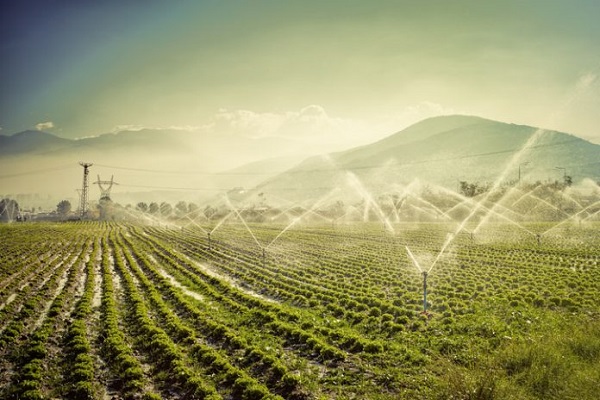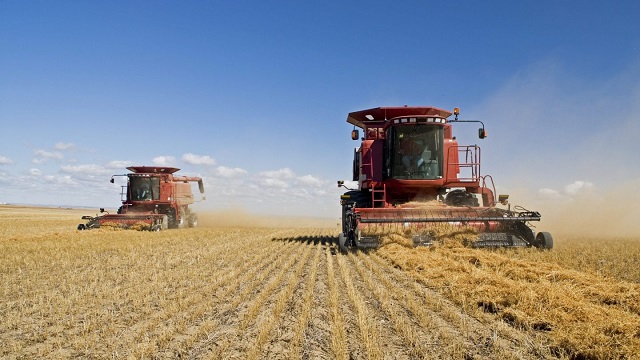Agriculture
‘Net-Zero’ Policies, ESG Reporting Raise Farm Costs, Food Prices—Report

From Heartland Daily News
So-called “net-zero” climate policies are imposing significant costs on American farmers and families, according to a new report from The Buckeye Institute.
A model developed by Buckeye for the report, Net-Zero Climate-Control Policies Will Fail the Farm, indicates that complying with net-zero emissions mandates, and environmental, social, and governance (ESG) reporting standards is likely to increase annual operating expenses for farmers by at least 34 percent. In addition, the model indicated the mandates will result in a 15 percent annual increase in grocery bills for families, as well as significant increases in individual grocery item prices, such as American cheese (79 percent), beef (70 percent), bananas (59 percent), rice (56 percent), and chicken (39 percent).
Net Zero and ESG
“Net-zero” refers to the balance between the amount of carbon dioxide emissions produced and the amount removed from the atmosphere. For a country to achieve “net-zero,” means either not producing any emissions at all or “offsetting” an equivalent amount of emissions through methods like “carbon capture and storage,” reforestation, and the use of “renewable” energy sources. Carbon dioxide pricing schemes like cap-and-trade systems or carbon dioxide taxes are other significant “net-zero” policies.
Meanwhile, ESG scores are essentially a risk assessment mechanism increasingly used by investment firms and financial institutions that force large and small companies to focus upon politically motivated, subjective goals which often run counter to their financial interests and the interests of their customers.
Companies are graded on these mandated commitments to promote, for example, climate or social justice objectives. Those that score poorly are punished by divestment, reduced access to credit and capital, and a refusal from state and municipal governments to contract with them.
ESG Targeting Agriculture
Many of ESG’s metrics, primarily those related to imposing environmental controls, are directly linked to the agricultural industry and food production. Examples of some of these metrics include: “Paris [climate agreement]-aligned GHG [greenhouse gas] emissions targets,” “Impact of GHG emissions,” “Land use and ecological sensitivity,” “Impact of air pollution,” “Impact of freshwater consumption and withdrawal,” “Impact of solid waste disposal,” and “Nutrients”—which, despite its innocuous-sounding name, is a metric that forces companies to estimate the “metric tonnes of nitrogen, phosphorous, and potassium in fertilizer consumed.”
Farmers and food producers use chemical fertilizers and pesticides for crop growth, in addition to producing waste biproducts, consuming substantial quantities of water, using vast swathes of land, and releasing what climate alarmists claim to be planet-ending carbon dioxide emissions.
“Europe, fully committed to the Paris Climate Accords’ decarbonization plan, provides a forecast of the agricultural and economic consequences likely to result from the ESG-reporting agenda,” the report notes. “After implementing strict ESG-reporting mandates, European banks, for example, became reluctant to lend to farmers with high nitrogen and methane emissions. Reduced credit strained family farms.
“Europe’s emissions cap-and-trade policies exacerbated the problem and helped put generational farmers out of business,” the report continues. “Those policies also raised prices of farm-related energy and fertilizer, which, in turn, raised the price of food and groceries.”
‘Immolated’ Farming Industry
The report describes how the European Union’s commitment to the Paris climate agreement and associated ESG and net zero goals are undermining its agricultural sector and food security, which has lessons for the United States.
“Europe immolated its farming industry and made the continent’s food supply more expensive and less secure,” the report says. “Adopting similar policies in the United States will yield similar results.”
Federal and State Fixes
The report makes a number of recommendations for what can be done to “avoid the failures of net-zero policies.”
Federally, they suggest the United States withdraw from the Paris Climate Accords, repeal the “renewable energy” and carbon capture and sequestration subsidies in the Inflation Reduction Act, and consider banning federal agencies like the Farm Credit Administration from utilizing ESG policies.
On the state level, the report recommends states legislatures pass laws preventing “state agencies, fund managers, insurers, and lenders from using ESG criteria to guide investment decisions and set insurance policies and premiums.”
Enlisting the Private Sector
For the private sector Buckeye’s report suggests corporate boards from industries “that will be negatively impacted by ESG reporting and other net-zero policies should inform shareholders about how ESG-reporting requirements will affect operations and long-term shareholder value.” They also suggest farmers “decouple farming practices from their purported climate benefits and use the methods that are best for their farms, families, and produce.”
“Government climate-control policies ensconced in the Paris Climate Accords, the Inflation Reduction Act, and ESG-guided mandates carry a hefty price tag, especially for U.S. farms and the American consumer,” the report concludes. “The full price of climate control policies and directives needs to be measured and understood, especially the costs they will inflict on American farms and households.”
‘Unrealistic, Unattainable,’ and Costly
Buckeye’s analysis is important for putting numbers on the high cost of ESG and Net Zero policies, providing an evidence-based warning to Americans not to follow Europe’s path, says Cameron Sholty, Executive Director of Heartland Impact.
“This report shows what American and European farmers intuitively knew: that net zero carbon emissions are unrealistic, unattainable, and ultimately add cost through the supply chain and ultimately to consumers’ pocket books,” said Sholty. “Buckeye should be commended for putting the numbers to the insidiousness of ill-advised carbon-free farming pursuits.
“Its folly imposed by activists seeking to control the means of production and how we live and thrive in a civilized society,” Sholty said.
Tim Benson ([email protected]) is a senior policy analyst with Heartland Impact.
For more on farm policy, click here.
For more on net zero, click here.
For more on ESG, click here.
Agriculture
Farming group accuses Canadian gov’t of trying to blame agriculture for ‘climate change’

From LifeSiteNews
Grain Farmers of Ontario chairman Jeff Harrison contends that the government’s goal of reducing emissions is not realistic and that the ‘vilification strategy’ is causing more consternation for farmers.
One of Canada’s largest farming groups has said the Liberal federal government of Prime Minister Justin Trudeau is directly going after farmers via a “vilification strategy” under the guise of “climate change” and that a recent Auditor General report proves this to be true.
Grain Farmers of Ontario chairman Jeff Harrison recently said that the Trudeau government’s request to farmers to reduce emissions is not realistic and that it only creates more issues for Canadian farmers.
“Painting this climate picture as the fault of agriculture, it vilifies farmers,” said Harrison, noting it’s a “vilification strategy” to pin the blame on farmers.
“It’s part of the added stress on farmers that they are expected to do the unachievable. They’re expected to solve a problem that they didn’t necessarily create,” he observed.
Harrison’s comments were made after a recent Auditor General report titled “Agriculture and Climate Change Mitigation” picked to pieces the Trudeau government’s voluntary 30 percent emission reduction target by 2030 through curbing fertilizer use for farmers.
The United Nations has declared a war on nitrogen, claiming its use must be slowed as it is “one of the most important pollution issues facing humans.”
However, nitrogen, which is found in fertilizers, makes up about 70 percent of Earth’s air and is essential for plants.
The Auditor General report noted that there is widespread mismanagement along with a lack of transparency from the federal programs. Notably, there was a lack of consultation with stakeholders in the farming industry, as well as farming associations, before the government put in place random fertilizer emission reduction targets.
Harrison noted that such reduction targets are “unachievable targets and unrealistic goals,” adding that such targets “p—– me off, to be honest.”
The war on farmers not unique to Canada
Farmers worldwide are facing increased pressure from governments and special interest groups linked to globalists organizations such as the World Economic Fourm to reduce fertilizer use. Indeed, as recently observed by Dr. Joseph Mercola with LifeSiteNews, the global push to get rid of farmers “from their land is being driven by NGOs, which are primarily funded by the government, making them government extensions.”
“The real agenda, however, may be traced back to the Club of Rome, a think tank that aligned with neo-malthusianism – the idea that an overly large population would decimate resources – and was intending to implement a global depopulation agenda,” Mercola wrote.
“Once the farmers are pushed out, globalists suggest eating bugs will protect the planet by eliminating the need for livestock, cutting down on agricultural land use and protecting the environment. The U.N.’s Food and Agriculture Organization also encourages the consumption of insects and insect-based foods, and the momentum to get farmers off their land is continuing to gain steam.”
Trudeau’s government is trying to force net-zero regulations on all Canadian provinces, notably on electricity generation, as early as 2035. The provinces of Alberta and Saskatchewan are adamantly opposed to Trudeau’s 2035 goals.
The Trudeau government’s current environmental goals, which are in lockstep with the United Nations’ 2030 Agenda for Sustainable Development, include phasing out coal-fired power plants, reducing fertilizer usage, and curbing natural gas use over the coming decades.
Pressure on farmers from Feds comes at same time they are dealing with higher suicide rates
When it comes to Canada’s farmers, they have already been under pressure with increased costs of fuel, not to mention all basic goods and items needed to run a farm, thanks to high inflation due in part to federal overspending.
More concerningly, increased pressures on farmers to curtail fertilizer use, and thus be faced with lower yields, come at the same time that recent studies show suicidal thoughts among farmers at extremely elevated levels.
The 2022 study from Ontario’s University of Guelph found nearly one-third of farmers have “had thoughts of suicide in the last 12 months.” The numbers are more than two times above the general population of Canada.
According to the study, about three-quarters of participating farmers experience “moderate to high-stress and half experience anxiety or depression.”
Adding to their stress, on April 1, Canada’s carbon tax, which was introduced by the government of Trudeau in 2019, increased from $65 to $85 per tonne despite seven of 10 provincial premiers objecting to the increase, and 70% of Canadians saying they are against it.
Trudeau has remained adamant that he will not pause the hikes.
He has pitched his carbon tax as the best way to reduce so-called carbon emissions. However, the tax has added extra financial burdens on households despite hundreds of dollars of rebates per family.
To reach Trudeau’s goal of net zero by 2050, the carbon tax would have to balloon to $350 per tonne.
The reduction and eventual elimination of the use of so-called “fossil fuels” and a transition to unreliable “green” energy has been pushed by the World Economic Forum (WEF) – the globalist group behind the socialist “Great Reset” agenda in which Trudeau and some of his cabinet are involved.
Agriculture
Bill C-282, now in the Senate, risks holding back other economic sectors and further burdening consumers

From the Frontier Centre for Public Policy
Bill C-282 currently sits in the Canadian Senate and stands on the precipice of becoming law in a matter of weeks. Essentially, this bill seeks to bestow immunity upon supply management from any potential future trade negotiations without offering increased market access to potential trade partners.
In simpler terms, it risks holding all other economic sectors hostage solely to safeguard the interests of a small, privileged group of farmers. This is far from an optimal scenario, and the implications of this bill spell bad news for Canadians.
Supply management, which governs poultry, egg, and dairy production in Canada, has traditionally enabled us to fulfill our domestic needs. Under this system, farmers are allocated government-sanctioned quotas to produce food for the nation. At the same time, high tariffs are imposed on imports of items such as chicken, butter, yogurt, cheese, milk, and eggs. This model has been in place for over five decades, ostensibly to shield family farms from economic volatility.
However, despite the implementation of supply management, Canada has witnessed a comparable decline in the number of farms as the United States, where a national supply management scheme does not exist. Supply management has failed to preserve much of anything beyond enriching select agricultural sectors.
For instance, dairy farmers now possess quotas valued at over $25 billion while concurrently burdening dairy processors with the highest-priced industrial milk in the Western world. Recent data indicates a significant surge in prices at the grocery store, with yogurt prices alone soaring by over 30 percent since December 2023. This escalation is increasingly straining the budgets of many consumers.
It’s evident to those knowledgeable about the situation that the emergence of Bill C-282 should come as no surprise. Proponents of supply management exert considerable influence over politicians across party lines, compelling them to support this bill to safeguard the interests of less than one percent of our economy, much to the ignorance of most Canadians. In the last federal budget, the dairy industry alone received over $300 million in research funds, funds that arguably exceed their actual needs.
While Canada’s agricultural sector accounts for approximately seven percent of our GDP, supply-managed industries represent only a small fraction of that figure. Supply-managed farms represent about five percent of all farms in Canada. Forging trade agreements with key partners such as India, China, and the United Kingdom is imperative not only for sectors like automotive, pharmaceuticals, and biotechnology but for the vast majority of farms in livestock and grains to thrive and contribute to global welfare and prosperity. It is essential to recognize that Canada has much more to offer than merely self-sufficiency in food production.
Over time, the marketing boards overseeing quotas for farmers have amassed significant power and have proven themselves politically aggressive. They vehemently oppose any challenges to the existing system, targeting politicians, academics, and groups advocating for reform or abolition. Despite occasional resistance from MPs and Senators, no major political party has dared to question the disproportionate protection afforded to one sector over others. Strengthening our supply-managed sectors necessitates embracing competition, which can only serve to enhance their resilience and competitiveness.
A recent example of the consequences of protectionism is the United Kingdom’s decision to walk away from trade negotiations with Canada due to disagreements over access to our dairy market. Not only do many Canadians appreciate the quality of British cheese, but increased competition in the dairy section would also help drive prices down, a welcome relief given current economic challenges.
In the past decade, Canada has ratified trade agreements such as CUSMA, CETA, and CPTPP, all of which entailed breaches in our supply management regime. Despite initial concerns from farmers, particularly regarding the impact on poultry, eggs, and dairy, these sectors have fared well. A dairy farm in Ontario recently sold for a staggering $21.5 million in Oxford County. Claims of losses resulting from increased market access are often unfounded, as farmer boards simply adjust quotas when producers exit the industry.
In essence, Bill C-282 represents a misguided initiative driven by farmer boards capitalizing on the ignorance of urban residents and politicians regarding rural realities. Embracing further protectionism will not only harm consumers yearning for more competition at the grocery store but also impede the growth opportunities of various agricultural sectors striving to compete globally and stifle the expansion prospects of non-agricultural sectors seeking increased market access.
Dr. Sylvain Charlebois is senior director of the agri-food analytics lab and a professor in food distribution and policy at Dalhousie University.
-

 Brownstone Institute14 hours ago
Brownstone Institute14 hours agoThe Predictable Wastes of Covid Relief
-

 Brownstone Institute17 hours ago
Brownstone Institute17 hours agoBook Burning Goes Digital
-

 Alberta9 hours ago
Alberta9 hours agoCanadian Christian chiropractor fights ‘illegal’ $65,000 fine for refusing to wear mask
-

 John Stossel14 mins ago
John Stossel14 mins agoThe Swamp Survived: Why Trump Failed to “Drain the Swamp”
-

 Media8 hours ago
Media8 hours agoCBC tries to hide senior executive bonuses
-

 conflict18 hours ago
conflict18 hours agoOver 200 Days Into War, Family Of American Hostage in Gaza Strives For Deal To Bring Son Home
-

 Energy1 hour ago
Energy1 hour agoU.S. EPA Unveils Carbon Dioxide Regulations That Could End Coal and Natural Gas Power Generation
-

 Bruce Dowbiggin12 hours ago
Bruce Dowbiggin12 hours agoDo It Once, Shame On You; Do It Twice, Shame On Me


